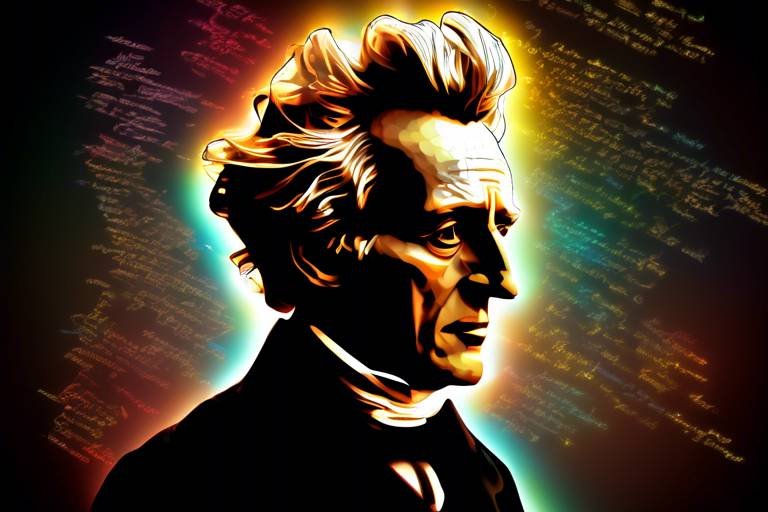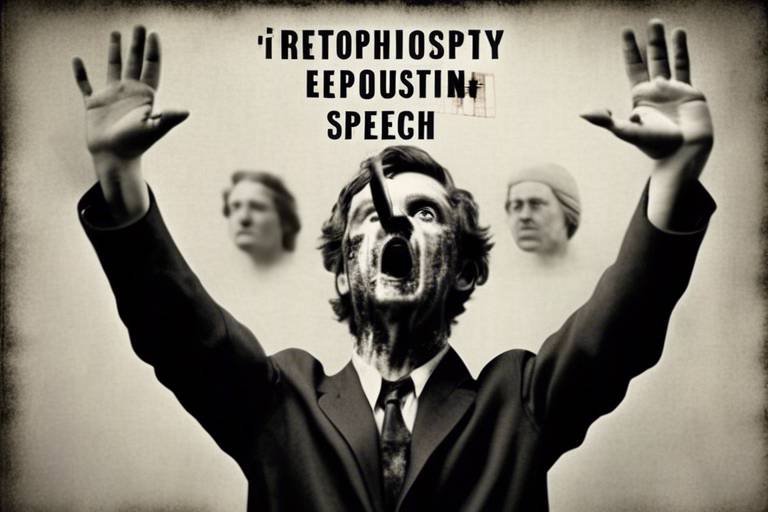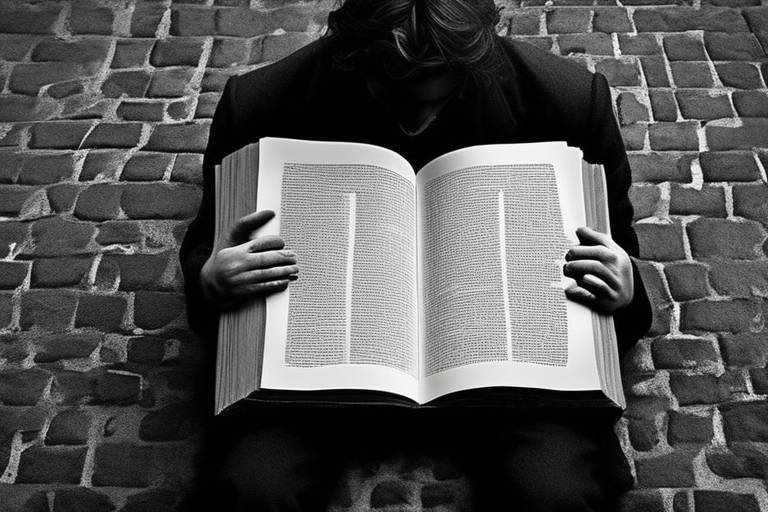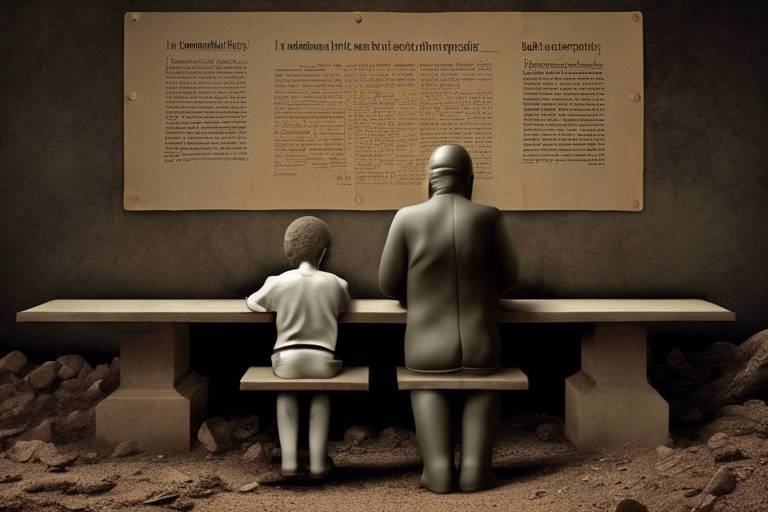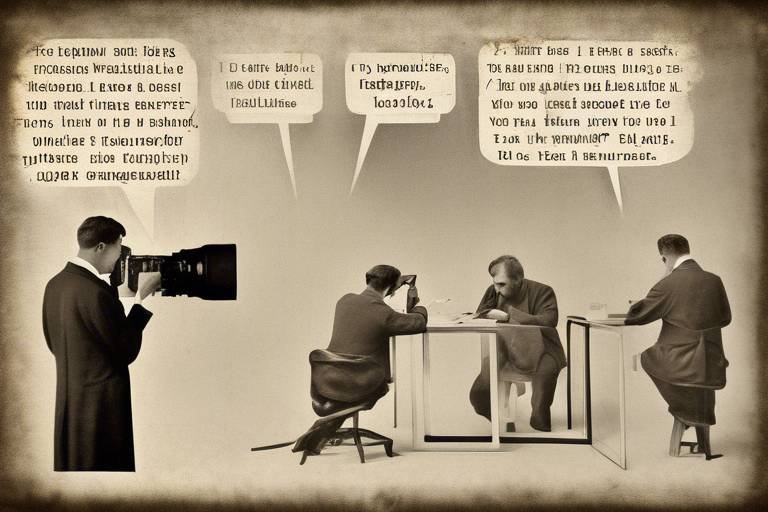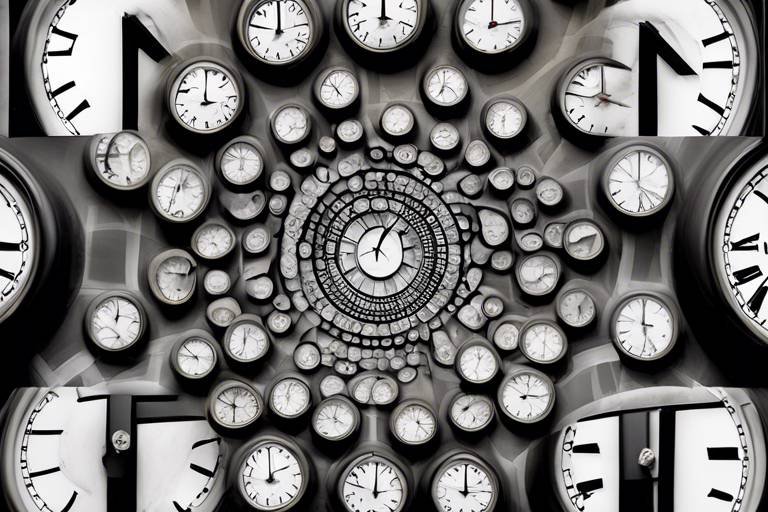Illuminating Kierkegaard's Principle of Existentialism
Existentialism is often seen as a complex web of thoughts and ideas, but at its core lies a simple yet profound truth: the search for meaning in our lives. Søren Kierkegaard, often dubbed the father of existentialism, invites us to dive deep into our own individuality and freedom. His philosophy challenges us to confront the very essence of our existence in a world that can often feel indifferent to our struggles and aspirations. So, what does it mean to truly exist? Kierkegaard’s insights provide a compelling framework for understanding not just ourselves, but also our place in the universe.
At the heart of Kierkegaard's philosophy is the idea that each individual is responsible for giving their own life meaning. This responsibility can feel daunting, especially when faced with the vastness of existence. However, Kierkegaard encourages us to embrace this challenge rather than shy away from it. He posits that through our choices, we can carve out our identity and purpose. It's like being an artist, where each decision we make adds color and depth to the canvas of our lives. The question then becomes: are you ready to pick up the brush?
One of the most striking aspects of Kierkegaard's existentialism is the emphasis on anxiety as a catalyst for self-discovery. Rather than viewing anxiety as something purely negative, Kierkegaard suggests that it can lead us to confront our true selves. Imagine standing at the edge of a cliff, feeling the rush of wind and the pull of gravity. This moment of anxiety can be terrifying, yet it also presents an opportunity for transformation. It’s in those moments of discomfort that we often find our most authentic selves. This exploration of anxiety not only highlights the tension between freedom and despair but also paves the way for personal growth.
As we delve deeper into Kierkegaard's thoughts, we encounter the concept of despair. He argues that despair is an intrinsic part of the human condition, acting as both a barrier to authentic existence and a potential pathway to personal growth. Think of despair as a fog that obscures the path ahead. It can be disorienting, but if we learn to navigate through it, we may discover new horizons. Kierkegaard categorizes despair into various types, each reflecting different degrees of disconnection from oneself and the divine. Understanding these types can illuminate our own struggles and help us to better comprehend our existential journeys.
Overcoming despair, according to Kierkegaard, requires a profound engagement with one's faith and self. It's about digging deep into our beliefs and values, and confronting the shadows that linger within us. This journey is not easy; it demands courage and introspection. However, the reward is a more authentic and meaningful existence. It’s akin to a phoenix rising from the ashes, where the trials we face ultimately lead to renewal and strength.
In this context, anxiety plays a crucial role in prompting individuals to confront their true selves. It’s a paradox: while anxiety can be uncomfortable, it can also foster a sense of authenticity and personal responsibility. When we face our anxieties head-on, we are given the chance to redefine our identity. The leap into the unknown can be exhilarating! Kierkegaard emphasizes that this leap of faith is not merely a blind jump but a conscious choice to believe in something greater than ourselves, even when rationality fails us.
As we navigate the complexities of modern life, Kierkegaard's existentialism remains relevant. It resonates with our quest for meaning and individuality amidst the chaos of contemporary existence. His ideas offer insights into mental health, encouraging us to embrace our struggles as part of the human experience. In a world that often prioritizes conformity, Kierkegaard's philosophy urges us to celebrate our uniqueness and to forge our own paths. So, as you ponder the intricacies of your existence, remember that the journey is yours to define. Will you embrace it?
- What is existentialism? Existentialism is a philosophical movement that emphasizes individual freedom, choice, and the search for meaning in a seemingly indifferent universe.
- How did Kierkegaard contribute to existentialism? Søren Kierkegaard is often considered the father of existentialism due to his exploration of individuality, anxiety, and faith.
- What role does anxiety play in Kierkegaard's philosophy? Kierkegaard views anxiety as a catalyst for self-discovery, prompting individuals to confront their true selves and embrace authenticity.
- How can one overcome despair according to Kierkegaard? Overcoming despair involves engaging deeply with one's faith and self, leading to a more authentic and meaningful existence.
- What is the 'leap of faith'? The 'leap of faith' is a conscious choice to believe in something beyond rational understanding, encouraging individuals to embrace uncertainty in their lives.
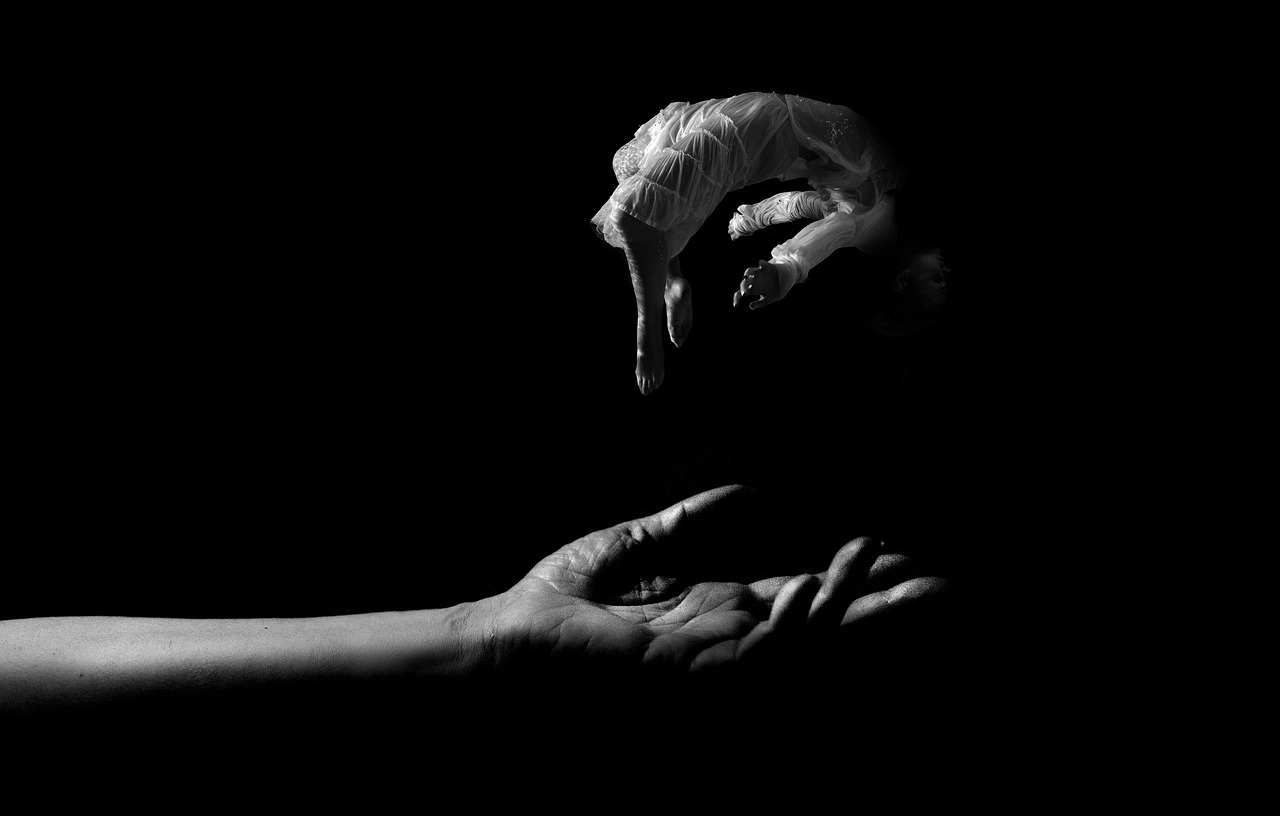
The Essence of Existentialism
Existentialism is a philosophical movement that dives deep into the human experience, emphasizing the importance of individuality, freedom, and the relentless quest for meaning in a world that often appears indifferent. At its core, existentialism challenges us to confront the fundamental questions of existence: Who are we? Why are we here? What is our purpose? These questions are not just abstract musings; they are the very essence of what it means to be human.
One of the most striking aspects of existentialism is its focus on the individual. Unlike many philosophical doctrines that prioritize universal truths or collective norms, existentialism places the individual at the center of the inquiry. This perspective encourages us to embrace our unique experiences and recognize that our paths are shaped by our choices. In a sense, we are the authors of our own lives, crafting our narratives in a world that can often feel chaotic and unpredictable.
Freedom is another cornerstone of existential thought. But this freedom comes with a heavy burden. While we have the power to make choices, we also bear the responsibility for those choices. This duality can be overwhelming, leading to feelings of anxiety and existential dread. Yet, it's precisely within this tension that we find the potential for growth and self-discovery. The freedom to choose means we can shape our destinies, but it also requires us to confront the consequences of our actions.
In the quest for meaning, existentialists argue that we must navigate a landscape filled with uncertainty. Life does not come with a manual, and the search for purpose can often feel like wandering through a dense fog. However, this uncertainty is not something to fear; it can be a source of profound insight. By engaging with our doubts and fears, we can uncover deeper truths about ourselves and the world around us. This journey is inherently personal and may involve grappling with various existential themes, such as:
- Authenticity: Living in accordance with one's true self, rather than conforming to societal expectations.
- Isolation: Recognizing that each individual ultimately faces their own existence alone.
- Absurdity: Understanding the conflict between our desire for meaning and the chaotic nature of the universe.
Ultimately, the essence of existentialism lies in its invitation to engage with these complexities. It encourages us to embrace our freedom, confront our anxieties, and seek authenticity in our lives. By doing so, we can cultivate a sense of meaning that is uniquely our own, even in a world that often seems devoid of it. Existentialism does not provide easy answers; rather, it challenges us to ask the right questions and embark on a journey of self-exploration that is both enriching and transformative.

Kierkegaard's Concept of Anxiety
Kierkegaard's exploration of anxiety is nothing short of a deep dive into the human psyche. He doesn’t just skim the surface; instead, he plunges into the murky waters of our emotions, revealing anxiety as a fundamental aspect of our existence. Imagine standing at the edge of a cliff, staring into the abyss below. That feeling of vertigo, that rush of uncertainty, is akin to the anxiety Kierkegaard describes. It’s a feeling that can paralyze us, but it can also serve as a powerful catalyst for self-discovery. In a world that often feels indifferent, anxiety becomes a mirror reflecting our deepest fears and desires.
At its core, Kierkegaard believed that anxiety arises from the tension between our **freedom** and the **responsibility** that comes with it. When we realize that we have the ability to choose our paths, we are also confronted with the weight of those choices. This realization can be overwhelming. It’s like being handed a blank canvas and a palette of colors, only to feel paralyzed by the endless possibilities. What if we choose wrong? What if we fail? These questions can lead to a state of despair, but Kierkegaard argues that this very anxiety is essential for authentic existence. It pushes us to confront our true selves and to make choices that align with our genuine desires.
In Kierkegaard’s view, anxiety is not just a negative experience; it’s a **necessary** part of the human condition that compels us to engage with our existence more fully. It’s the spark that ignites our journey toward self-awareness. When we feel anxious, we are invited to explore the depths of our being. It’s an opportunity to ask ourselves tough questions: Who am I? What do I truly want? These reflections can lead to profound insights and a deeper understanding of our place in the universe.
Despair is intricately linked to anxiety in Kierkegaard's philosophy. He posits that despair acts as a barrier to authentic existence. When we are in despair, we are disconnected from our true selves, trapped in a cycle of negative thoughts and feelings. This state can be likened to walking through a fog; everything seems obscured, and the path ahead is unclear. Yet, Kierkegaard suggests that despair can also be a pathway to personal growth. By confronting our despair, we can begin to peel back the layers of our identity and uncover the essence of who we are.
Kierkegaard categorizes despair into several types, each reflecting different degrees of disconnection from the self and the divine. Understanding these types can help individuals navigate their existential journeys more effectively. Here’s a brief overview:
| Type of Despair | Description |
|---|---|
| Despair of Finitude | Feeling trapped in the limitations of life, often leading to a sense of hopelessness. |
| Despair of Infinitude | Being overwhelmed by endless possibilities, leading to paralysis and inaction. |
| Despair of the Self | Feeling disconnected from one's true self, leading to a loss of identity. |
Overcoming despair is not an easy task, but Kierkegaard emphasizes the importance of engaging deeply with one’s faith and self. It requires a willingness to confront uncomfortable truths and to embrace the uncertainties of life. Just as a sculptor chisels away at a block of marble to reveal the statue within, individuals must work through their despair to uncover their authentic selves. This journey can lead to a more meaningful existence, where choices are made not out of fear but from a place of self-awareness and confidence.
Ultimately, anxiety can serve as a powerful motivator for individuals to confront their true selves. It compels us to take a hard look at our lives and to embrace our individuality. In doing so, we foster a sense of authenticity that is essential for personal responsibility. Instead of shying away from anxiety, Kierkegaard invites us to lean into it, to explore its depths, and to emerge stronger and more self-aware. This journey toward authenticity is not just about finding peace; it’s about embracing the chaos of existence and discovering the beauty within it.
- What is Kierkegaard's view on anxiety? Kierkegaard sees anxiety as a fundamental aspect of human existence that can lead to self-discovery and authenticity.
- How does despair relate to anxiety? Despair is a state that can arise from anxiety, acting as a barrier to authentic existence but also serving as a pathway for personal growth.
- Can anxiety be positive? Yes, according to Kierkegaard, anxiety can motivate individuals to confront their true selves and make meaningful choices.

The Role of Despair
Despair, as articulated by Kierkegaard, is not merely a state of being but a profound aspect of the human experience. It acts as a mirror, reflecting our deepest fears and vulnerabilities. Think of despair as a heavy fog that envelops our journey through life, obscuring the path ahead and making it difficult to see where we are going. Yet, paradoxically, this fog can also serve as a catalyst for self-discovery and growth. When one confronts despair, it forces an individual to grapple with their identity and existence, ultimately leading to a more authentic life.
At its core, despair signifies a disconnection from oneself and the divine. It challenges us to ask hard questions: Who am I? What do I truly value? Kierkegaard posits that this disconnection is not just a barrier but also an opportunity. It compels individuals to reflect on their choices and the authenticity of their existence. This struggle can be likened to a sculptor chiseling away at a block of marble; only by confronting the rough edges of despair can one reveal the masterpiece within.
In Kierkegaard's philosophy, despair manifests in various forms, each representing a different level of estrangement from the self. These types of despair can be categorized as follows:
- Despair of Defiance: This form arises when individuals refuse to acknowledge their limitations and reject the very notion of needing anything beyond themselves.
- Despair of Weakness: Here, individuals feel overwhelmed by their circumstances, leading to a sense of helplessness and resignation.
- Despair of the Spirit: This is perhaps the most profound, where individuals experience a deep sense of disconnection from their true selves and from God.
Understanding these types of despair can illuminate the path toward overcoming them. For Kierkegaard, the journey through despair is essential for personal growth; it is a necessary step toward achieving authenticity. By confronting despair head-on, individuals can begin to peel away the layers of self-deception and societal expectations that cloud their true identity.
Ultimately, the role of despair in Kierkegaard's existentialism is not to paralyze us but to propel us forward. It serves as a reminder that while life may be fraught with challenges, it is through these very challenges that we can find clarity and purpose. Embracing despair can lead to profound transformations, as individuals learn to navigate their inner turmoil and emerge with a renewed sense of self. In this way, despair is not just a hindrance; it is a vital part of the human condition that can guide us toward a more meaningful existence.
- What is the significance of despair in Kierkegaard's philosophy? Despair is a crucial element that prompts individuals to confront their true selves, leading to personal growth and authenticity.
- How does Kierkegaard categorize despair? He categorizes despair into types such as despair of defiance, despair of weakness, and despair of the spirit, each reflecting different disconnections from the self.
- Can despair lead to positive outcomes? Yes, by engaging with despair, individuals can achieve greater self-awareness and authenticity, transforming their understanding of themselves and their existence.
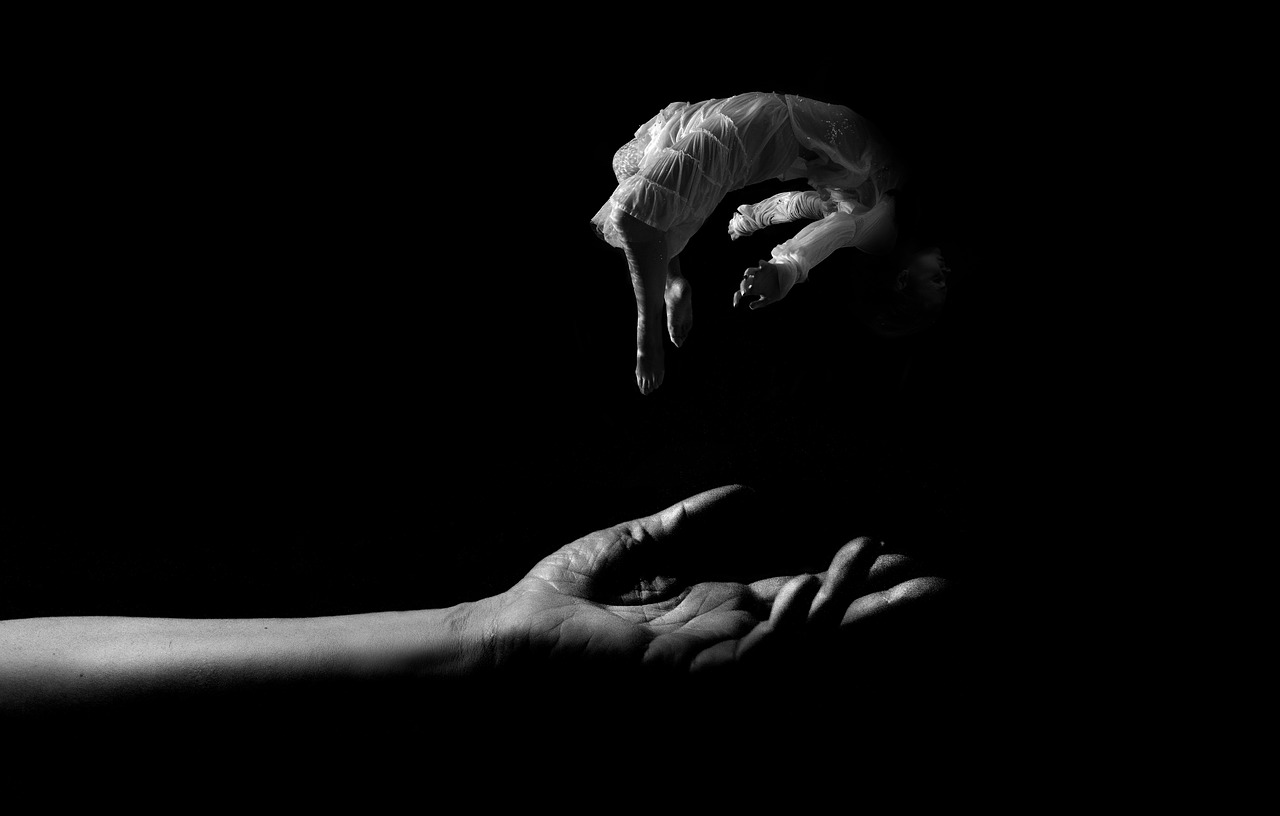
When we dive into Kierkegaard's philosophy, we quickly realize that despair is not a one-size-fits-all experience. In fact, he categorizes despair into various types, each reflecting a unique relationship with the self and the divine. This classification serves as a roadmap for understanding how individuals grapple with their existence. Think of it like different shades of a color; each type of despair has its own hue, influencing how we perceive our reality and our place in it.
First off, there's despair of finitude. This type arises when individuals become acutely aware of their limitations and the transient nature of life. It’s that feeling of being trapped in a cycle of mundane existence, where the weight of reality presses down, leaving one feeling powerless. Imagine standing at the edge of a vast ocean, knowing you can only dip your toes in but never truly explore its depths. This despair often leads to a sense of stagnation, where one feels stuck in the day-to-day grind.
Next, we encounter the despair of infinitude. This occurs when a person becomes overwhelmed by the vastness of possibilities and choices available to them. It’s like standing in a candy store filled with every imaginable treat, yet feeling paralyzed by the sheer number of options. The fear of making the wrong choice can lead to a kind of existential paralysis, where one is so consumed by the infinite possibilities that they end up choosing nothing at all. This type of despair reflects a disconnect from the self, as individuals grapple with their desires and the overwhelming nature of freedom.
Then, there’s the despair of the self, which is perhaps the most profound. This form of despair emerges when individuals feel disconnected from their true essence. It’s that nagging feeling that you’re wearing a mask, playing a role that doesn’t resonate with who you really are. You might be successful by societal standards, yet inside, you feel like an imposter. This despair is a call to authenticity, urging individuals to peel back the layers and confront their true selves.
In summary, Kierkegaard's types of despair are more than just categories; they are reflections of our existential struggles. Understanding these types can help individuals navigate their personal journeys, shedding light on the intricate relationship between despair, self-awareness, and the quest for authenticity. By recognizing the specific nature of their despair, individuals can begin to take steps toward overcoming it, ultimately leading to a more meaningful existence.
- What is the significance of despair in Kierkegaard's philosophy?
Despair is central to Kierkegaard's existentialism as it highlights the struggle for authenticity and self-awareness, serving as both a barrier and a catalyst for personal growth. - How can understanding types of despair help in personal development?
By identifying the specific type of despair one is experiencing, individuals can better understand their feelings and take actionable steps toward overcoming them, leading to a more authentic life. - Is despair always negative according to Kierkegaard?
Not necessarily. While despair can be painful, Kierkegaard sees it as an opportunity for self-discovery and growth, ultimately guiding individuals toward a more meaningful existence.

Overcoming despair is not just about lifting a heavy weight off your shoulders; it's about embarking on a profound journey towards self-discovery and authenticity. Kierkegaard believed that despair can act as a mirror reflecting our deepest fears and desires, challenging us to confront the very essence of who we are. Imagine standing at the edge of a vast abyss, filled with uncertainties. It’s daunting, right? But what if that abyss is actually a gateway to a more meaningful existence?
To truly overcome despair, one must engage deeply with both faith and self-awareness. Kierkegaard posited that despair often stems from a disconnection with our true selves and the divine. When we feel lost, it’s as if we are wandering through a fog, unable to see the path ahead. However, by cultivating a relationship with our faith—whatever that may mean for each individual—we can start to clear that fog. This relationship doesn’t have to be religious; it can be a belief in something greater than ourselves, a commitment to our values, or even a passion that ignites our spirit.
Here are some key steps to overcoming despair:
- Self-Reflection: Take time to understand your feelings. Journaling can be a powerful tool for this. Write down your thoughts and emotions, allowing yourself to explore the depths of your despair.
- Seek Connection: Reach out to others. Sharing your struggles can lighten the burden and provide new perspectives.
- Engage with Faith: Whether through prayer, meditation, or contemplation, finding a spiritual practice can help ground you in times of uncertainty.
- Accept Your Feelings: Understand that feelings of despair are a natural part of the human experience. Instead of fighting them, embrace them as part of your journey.
By actively engaging with these steps, we can transform despair from a crippling force into a catalyst for personal growth. It’s akin to a seed buried in the dark earth; it must break through the soil to reach the sunlight. This journey might be uncomfortable, and it may require us to face painful truths, but it is also where we find the potential for renewal and growth. As we navigate through despair, we are not just surviving; we are learning to thrive.
Ultimately, overcoming despair is about reclaiming our narrative. It’s about recognizing that while despair may feel like a heavy cloak draped over us, we have the power to shed it and step into the light of our true selves. The journey is not easy, but it is undoubtedly worthwhile. With each step taken towards understanding and embracing our despair, we inch closer to a life filled with authenticity, purpose, and joy.

When we think about anxiety, it often conjures up feelings of dread and discomfort. Yet, in the philosophical realm of Kierkegaard, anxiety takes on a different hue. Instead of merely being a negative force, it emerges as a powerful catalyst for self-discovery. Imagine standing at the edge of a cliff, peering into the abyss; that moment of hesitation, that rush of fear, can also ignite a profound journey inward. Kierkegaard posits that anxiety prompts us to confront our true selves, pushing us to explore the depths of our existence. It’s in this tension between fear and freedom that we can find our most authentic selves.
But how does this work? Anxiety compels us to question our choices, our beliefs, and ultimately, our identity. It forces us to ask, “Who am I really?” This introspection is not just a fleeting thought; it’s a deep dive into the essence of our being. We begin to realize that our choices matter. Each decision we make is a brushstroke on the canvas of our lives, shaping our identity in ways we may not fully comprehend. The beauty of this process is that it’s uniquely ours, making authenticity not just a goal but a journey.
Moreover, Kierkegaard argues that this journey toward authenticity is fraught with challenges. The fear of making the wrong choice can be paralyzing. However, it is essential to remember that anxiety can also be a source of strength. It encourages us to take responsibility for our lives, to acknowledge that we have the power to shape our destinies. By embracing our anxiety, we can transform it into a driving force for personal growth.
In this light, anxiety becomes not just an obstacle but a vital part of our quest for authenticity. It’s like a compass, guiding us through the murky waters of self-doubt and uncertainty. The more we engage with our anxiety, the clearer our path toward genuine self-expression becomes. This engagement is not merely about understanding our fears; it’s about using them as a springboard for action. When we confront our anxieties, we can begin to dismantle the barriers that separate us from our true selves.
In conclusion, embracing anxiety is a crucial step in the journey toward authenticity. It challenges us to face our fears, encourages self-reflection, and ultimately leads to a more profound understanding of who we are. So, the next time anxiety knocks on your door, instead of shutting it out, consider inviting it in for a chat. After all, it may just be the key to unlocking the authentic you.
- What is Kierkegaard's view on anxiety?
Kierkegaard views anxiety as a crucial part of the human experience, serving as a catalyst for self-discovery and authenticity. - How can anxiety lead to authenticity?
By confronting our anxieties, we engage in self-reflection, which helps us understand our true selves and make meaningful choices. - Is anxiety always a negative experience?
Not necessarily. While anxiety can be uncomfortable, it can also motivate personal growth and deeper understanding. - What is the relationship between freedom and anxiety?
Kierkegaard suggests that anxiety arises from the tension between our desire for freedom and the fear of the unknown that comes with it.
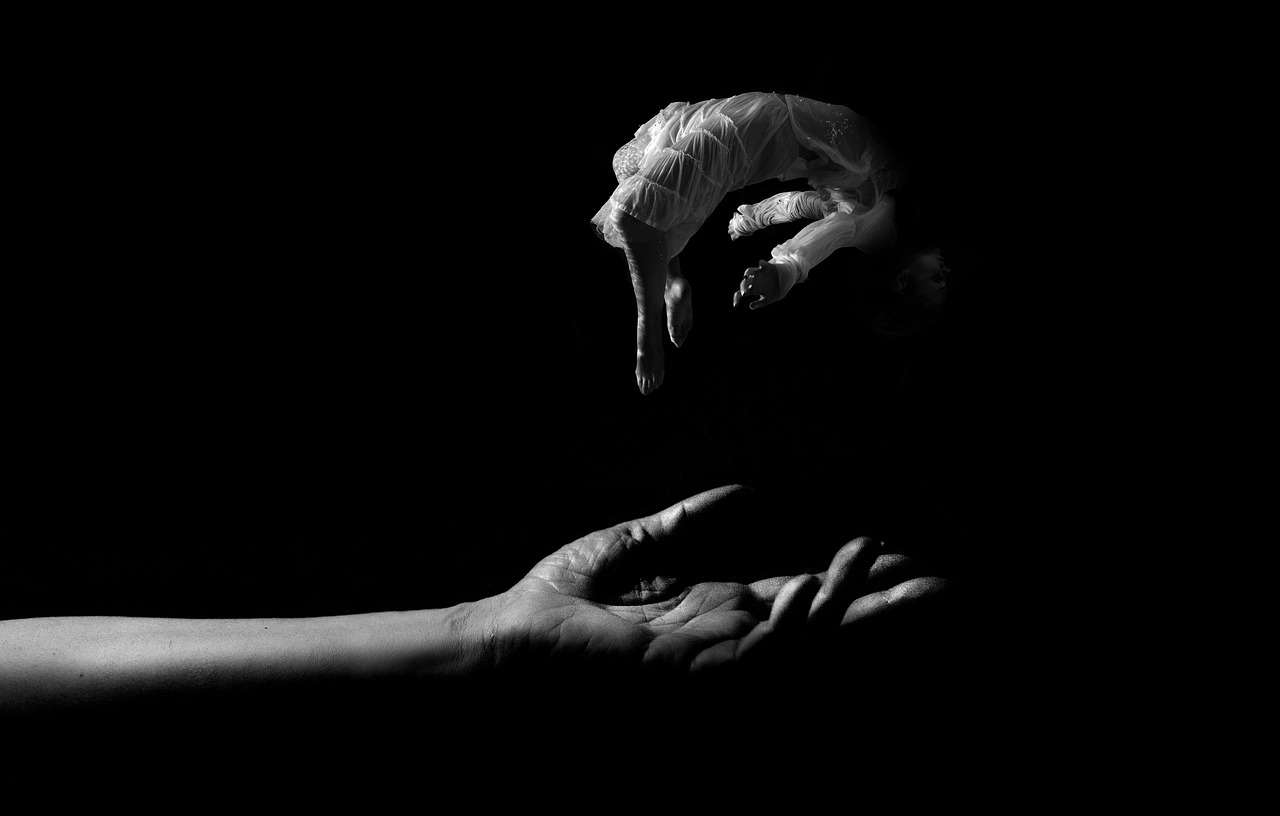
The concept of the leap of faith is one of the most intriguing aspects of Kierkegaard's existentialism. Imagine standing on the edge of a cliff, the vast unknown stretching out before you. This leap, while daunting, symbolizes a conscious decision to embrace uncertainty and trust in something greater than oneself. Kierkegaard believed that this act is not just a moment of impulsive bravery; rather, it is a profound commitment to belief that transcends rational understanding. In our daily lives, we often find ourselves at crossroads where we must make choices that defy logic or societal expectations. The leap of faith encourages us to take the plunge into the unknown, to trust in our instincts, and to believe in our potential for growth and transformation.
At its core, the leap of faith challenges us to confront our fears and uncertainties. It asks us to consider questions like: What do we truly believe in? What are we willing to risk for our convictions? In a world filled with skepticism and doubt, taking a leap of faith can feel like swimming against the current. Yet, it is precisely this act of defiance that can lead to a richer, more fulfilling existence. When we leap, we not only embrace our personal beliefs but also cultivate a deeper understanding of our identity. The leap is not merely about faith in a religious context; it can also pertain to faith in ourselves, our dreams, and our relationships.
Moreover, the leap of faith has significant implications for our personal identity. As we navigate the complexities of life, our beliefs and values often come under scrutiny. The act of leaping requires us to evaluate what matters most to us and to align our actions with our core principles. This alignment fosters authenticity, allowing us to live a life that is true to ourselves rather than conforming to external expectations. In this sense, the leap of faith is a transformative journey that encourages self-discovery and personal responsibility.
In practical terms, embracing the leap of faith can manifest in various ways. Consider the following:
- Career Changes: Taking a leap of faith may mean leaving a stable job to pursue a passion.
- Relationships: It can involve opening your heart to love, despite the fear of vulnerability.
- Personal Growth: It might mean confronting your fears and stepping outside your comfort zone.
Ultimately, the leap of faith is about **embracing the unknown** and recognizing that while the future may be uncertain, it is also filled with possibilities. It invites us to trust in our journey and to have faith that we can navigate whatever comes our way. In a world that often feels chaotic and unpredictable, this leap can serve as an anchor, guiding us toward a meaningful existence grounded in our beliefs and aspirations.
- What is the leap of faith according to Kierkegaard? The leap of faith is a conscious choice to believe in something beyond rational understanding, embracing uncertainty in the pursuit of meaning.
- How does the leap of faith influence personal identity? It encourages individuals to align their actions with their core beliefs, fostering authenticity and self-discovery.
- Can the leap of faith apply to everyday decisions? Absolutely! It can manifest in career choices, relationships, and personal growth, inviting us to take risks for what we truly value.
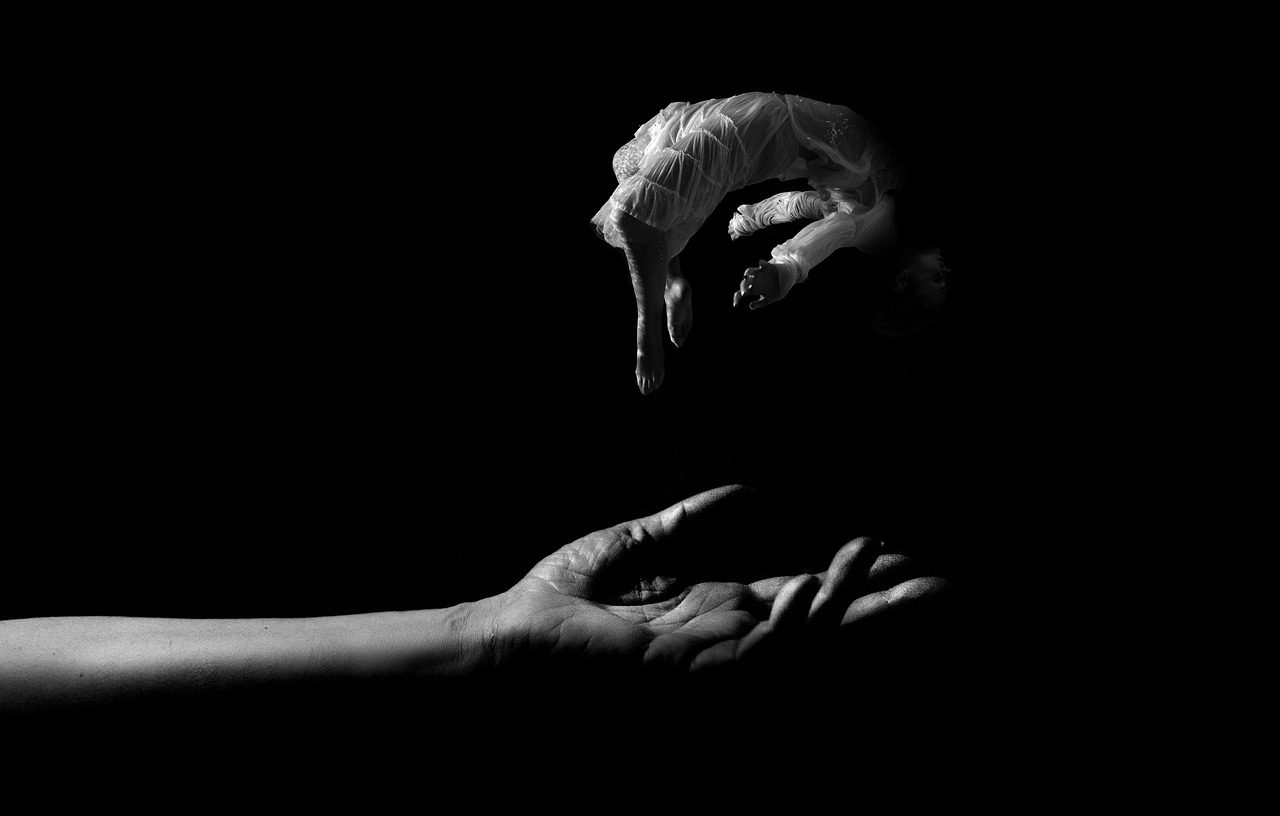
leap of faith
This article explores the foundational aspects of Kierkegaard's existentialism, delving into its significance, core concepts, and implications for contemporary thought and personal identity.
Existentialism is all about the *individual*—the unique experience of being human. At its core, this philosophy emphasizes the importance of personal freedom and the relentless quest for meaning in a universe that often feels indifferent to our existence. Think of it as a journey where each person is the captain of their own ship, navigating the turbulent waters of life. In this vast ocean, we encounter waves of uncertainty, yet it’s our responsibility to steer toward our own truth.
Kierkegaard's exploration of anxiety reveals its role as a catalyst for self-discovery and authentic existence, highlighting the tension between freedom and despair. He believed that anxiety isn't merely a negative feeling; rather, it's a signal that we are on the brink of something profound. It’s like standing at the edge of a cliff, feeling both terrified and exhilarated by the potential of flight. This tension is where true growth begins.
Despair, according to Kierkegaard, is a fundamental aspect of the human condition, serving as a barrier to authentic existence and a pathway to personal growth. It’s that nagging feeling when we realize we’re not living up to our potential. Despair can feel overwhelming, but it can also be a powerful motivator. Just as a caterpillar must struggle to break free from its cocoon, so too must we confront our despair to emerge as our true selves.
Kierkegaard categorizes despair into different types, each reflecting varying degrees of disconnection from the self and the divine, influencing one's existential journey. These types can be seen as stages in a journey where one might feel:
- Despair of Defiance: A rejection of one's true self.
- Despair of Weakness: A feeling of helplessness and resignation.
- Despair of the Infinite: A longing for something greater that feels unattainable.
Understanding these types helps us navigate our own feelings of despair and recognize that they are not endpoints, but rather, stepping stones toward growth.
Overcoming despair requires a deep engagement with one’s faith and self, leading to a more authentic and meaningful existence. It’s akin to climbing a mountain; the ascent is challenging, but the view from the top is worth every ounce of effort. By embracing our struggles and seeking connection with something greater than ourselves, we can transform despair into a source of strength.
This subsection examines how anxiety can prompt individuals to confront their true selves, ultimately fostering authenticity and personal responsibility. Anxiety can be a mirror, reflecting our deepest fears and desires. When we look into it, we might see shadows of who we are and who we could become. This confrontation is not easy, but it’s essential for growth.
Kierkegaard emphasizes the importance of the in embracing uncertainty and faith, serving as a transformative act in the pursuit of meaning. This leap is not just a casual jump; it’s a deliberate choice to believe in something that transcends our rational understanding. It's like stepping off a ledge, trusting that something will catch you, even when you can't see it.
The leap of faith is a conscious choice to believe in something beyond rational understanding, challenging individuals to embrace uncertainty in their lives. It’s about saying, “I don’t have all the answers, but I’m willing to trust the process.” This leap can apply to various aspects of life, whether it’s love, career choices, or personal beliefs. It’s the moment we decide to take a chance on ourselves and our dreams.
This concept significantly influences personal identity, as individuals navigate their beliefs and values amidst the complexities of existence. The leap of faith encourages us to redefine ourselves, not as mere products of our environment, but as active participants in our own narratives. It’s empowering to realize that we are the authors of our own stories, and the leap allows us to write new chapters that reflect our true selves.
Kierkegaard's existentialism continues to resonate in contemporary philosophy and psychology, offering insights into individualism, mental health, and the quest for meaning in modern life. In a world filled with distractions and noise, Kierkegaard's ideas remind us to pause, reflect, and truly engage with our existence.
- What is existentialism? Existentialism is a philosophical movement that focuses on individual freedom, choice, and the search for meaning in life.
- How does Kierkegaard define anxiety? Kierkegaard views anxiety as a necessary part of the human experience, prompting self-discovery and personal growth.
- What is the leap of faith? The leap of faith is a conscious decision to believe in something beyond rational understanding, embracing uncertainty in our lives.
- How can I overcome despair? Overcoming despair involves engaging deeply with your faith and self, allowing for personal growth and authenticity.

in embracing uncertainty and faith, serving as a transformative act in the pursuit of meaning.
This article explores the foundational aspects of Kierkegaard's existentialism, delving into its significance, core concepts, and implications for contemporary thought and personal identity.
This section outlines the core principles of existentialism, emphasizing individuality, freedom, and the search for meaning in a seemingly indifferent universe.
Kierkegaard's exploration of anxiety reveals its role as a catalyst for self-discovery and authentic existence, highlighting the tension between freedom and despair.
Despair, according to Kierkegaard, is a fundamental aspect of the human condition, serving as a barrier to authentic existence and a pathway to personal growth.
Kierkegaard categorizes despair into different types, each reflecting varying degrees of disconnection from the self and the divine, influencing one's existential journey.
Overcoming despair requires a deep engagement with one’s faith and self, leading to a more authentic and meaningful existence.
This subsection examines how anxiety can prompt individuals to confront their true selves, ultimately fostering authenticity and personal responsibility.
Kierkegaard emphasizes the importance of the leap of faith in embracing uncertainty and faith, serving as a transformative act in the pursuit of meaning.
The leap of faith is a conscious choice to believe in something beyond rational understanding, challenging individuals to embrace uncertainty in their lives.
This concept significantly influences personal identity, as individuals navigate their beliefs and values amidst the complexities of existence.
Kierkegaard's existentialism continues to resonate in contemporary philosophy and psychology, offering insights into individualism, mental health, and the quest for meaning in modern life.
In the journey of life, we often find ourselves standing at the crossroads of uncertainty and faith. Embracing this uncertainty is not merely an act of bravery; it is a transformative journey that reshapes our understanding of existence. Just like a tightrope walker who must trust their balance while suspended high above the ground, we too must learn to navigate the delicate balance between doubt and belief. Kierkegaard argues that this leap into the unknown is essential for personal growth, as it encourages us to confront our fears and uncertainties head-on.
When we take that leap, we are not just seeking answers; we are actively participating in the creation of our own meaning. This act of faith can be likened to planting a seed in the ground, unsure if it will blossom. Yet, with patience and belief, it may flourish into something beautiful. In this way, embracing uncertainty allows us to cultivate a deeper connection with ourselves and the world around us. It pushes us to ask profound questions, such as:
- What do I truly value?
- What does it mean to live authentically?
- How do I navigate the complexities of my existence?
By grappling with these questions, we engage in a dialogue with our inner selves, leading to a more profound understanding of our personal identity. Kierkegaard suggests that this engagement is not always comfortable; it can be fraught with anxiety and doubt. However, it is through these challenges that we discover our true selves and the essence of our existence.
- What is existentialism? Existentialism is a philosophical movement that emphasizes individual freedom, choice, and the search for meaning in a seemingly indifferent universe.
- How does Kierkegaard define despair? Kierkegaard views despair as a fundamental aspect of the human condition, which can either hinder or promote personal growth depending on how one engages with it.
- What is the leap of faith? The leap of faith is a conscious decision to believe in something beyond rational understanding, embracing uncertainty and the unknown.

The concept of the leap of faith is central to Kierkegaard's existential philosophy, and it's not just some abstract idea floating around in the ether. It’s a profound, personal decision that each individual must confront. Imagine standing on the edge of a cliff, staring into the abyss below. That moment of hesitation, that flutter in your stomach, is akin to the leap of faith. It's about making a choice to believe in something that transcends rational thought and empirical evidence. This leap is not merely a blind jump; rather, it is a conscious and deliberate act of embracing uncertainty, a commitment to pursue meaning despite the chaos of life.
Kierkegaard suggests that this leap is essential for anyone wishing to live authentically. It’s about stepping away from the comfortable confines of societal norms and expectations to forge one’s own path. But what does this really look like in practice? It involves a few key elements:
- Embracing Uncertainty: Life is unpredictable, and the leap of faith acknowledges that uncertainty is a fundamental aspect of our existence.
- Personal Responsibility: By taking this leap, individuals accept the responsibility for their choices, understanding that they shape their own identities and destinies.
- Faith Beyond Reason: It’s about believing in something greater than oneself, whether that be God, love, or even a personal vision, despite the lack of concrete evidence.
When individuals engage in this leap, they often find themselves at a crossroads, faced with the tension between their current state and the potential for something greater. This transformative act can lead to a profound sense of purpose and fulfillment. However, it’s not without its challenges. The leap can feel daunting, and the fear of failure or the unknown can be paralyzing. Yet, as Kierkegaard argues, the very act of leaping can lead to a deeper understanding of oneself and one’s beliefs. It’s a journey of self-discovery that demands courage and introspection.
Ultimately, the leap of faith is about transcending the limitations of rationality and embracing a more profound truth that resonates on a personal level. It invites individuals to ask themselves: What do I truly believe? What am I willing to risk for my convictions? In a world that often feels indifferent, this leap can be a powerful affirmation of one’s existence and purpose.
- What is the leap of faith in Kierkegaard's philosophy? The leap of faith is a conscious choice to believe in something beyond rational understanding, embracing uncertainty in life.
- Why is the leap of faith important? It allows individuals to live authentically and take responsibility for their choices, shaping their own identities and destinies.
- How can one prepare for the leap of faith? Engaging in self-reflection, understanding personal beliefs, and confronting fears can help prepare for this transformative act.

Understanding Kierkegaard's existentialism is like peeling back layers of an onion; each layer reveals something deeper about ourselves and our place in the universe. In a world that often feels chaotic and unpredictable, Kierkegaard’s emphasis on the leap of faith serves as a powerful reminder of how our beliefs shape our personal identity. It's not just about existing; it's about living authentically and embracing the choices that define who we are.
When we consider the impact of existentialism on personal identity, we must acknowledge that it pushes us to confront uncomfortable truths about ourselves. Have you ever felt a nagging sense of disconnection or unease? Kierkegaard believed that this feeling often stems from our struggle to reconcile our inner selves with the external world. He argued that until we confront our own despair and anxiety, we cannot fully understand who we are. This confrontation is crucial because it allows us to strip away societal expectations and discover our true essence.
Moreover, Kierkegaard’s philosophy invites us to take responsibility for our choices. In contemporary society, where many people feel lost or overwhelmed, this idea is particularly relevant. It encourages us to ask ourselves fundamental questions: What do I truly believe? What values do I want to uphold? By engaging with these questions, we begin to forge an identity that is not merely a reflection of our surroundings but a genuine expression of our inner selves.
Interestingly, Kierkegaard also suggests that our personal identity is not static; it evolves over time as we navigate through life’s challenges and uncertainties. This dynamic nature of identity can be likened to a river—always flowing, constantly shaped by the landscape around it. Just as a river carves its path over time, our experiences and choices shape who we become. Therefore, embracing the leap of faith can be seen as a transformative act, allowing us to redefine our identity in light of new experiences and insights.
To illustrate this further, let’s break down the key components of how Kierkegaard’s existentialism impacts personal identity:
| Component | Description |
|---|---|
| Authenticity | The pursuit of living in accordance with one's true self rather than societal expectations. |
| Responsibility | Recognizing that we are accountable for our choices and their impact on our identity. |
| Dynamic Nature | Understanding that identity is fluid and can evolve through experiences and decisions. |
In conclusion, Kierkegaard’s existentialism profoundly shapes our understanding of personal identity by urging us to embrace our freedom and confront our anxieties. It challenges us to take a leap of faith, not just in a religious sense, but as a metaphor for living fully and authentically. As we navigate the complexities of modern life, this philosophy serves as a beacon, guiding us toward a more meaningful existence and a deeper understanding of who we are.
- What is existentialism? Existentialism is a philosophical movement that focuses on individual existence, freedom, and the search for meaning in a seemingly indifferent universe.
- How does Kierkegaard's existentialism differ from other forms? Kierkegaard emphasizes subjective experience and personal choice, particularly the importance of faith and personal responsibility in shaping identity.
- Can anxiety be beneficial? Yes, Kierkegaard argues that anxiety can prompt self-discovery and lead to a more authentic existence.
- What is the leap of faith? The leap of faith is a conscious decision to believe in something beyond rational understanding, essential for embracing uncertainty in life.

In today's fast-paced world, Kierkegaard's existentialism resonates more than ever. As we navigate through the complexities of modern life, many individuals find themselves grappling with questions of identity, purpose, and authenticity. The **individualism** that Kierkegaard championed encourages us to embrace our unique paths, reminding us that each person's journey is distinct and worthy of exploration.
Moreover, the rise of mental health awareness has brought existential themes to the forefront. Many people experience feelings of anxiety and despair, which Kierkegaard described as integral to the human condition. These emotions can serve as catalysts for self-discovery, prompting individuals to confront their true selves. In a world often characterized by superficial connections and societal pressures, Kierkegaard's insights urge us to dig deeper and seek **authenticity** in our lives.
Additionally, the concept of the **leap of faith** remains profoundly relevant. In an era marked by uncertainty—be it in relationships, careers, or global events—the act of embracing faith and the unknown can be transformative. This leap is not merely about religious belief; it extends to trusting oneself and making choices that align with one's values. It challenges us to step outside the confines of rationality and societal expectations, fostering a sense of personal responsibility and freedom.
To illustrate how existentialism manifests in contemporary thought, consider the following table that highlights key areas where these principles apply:
| Area | Existential Principle | Modern Application |
|---|---|---|
| Identity | Individuality | Embracing diverse identities and personal narratives |
| Mental Health | Anxiety and Despair | Therapeutic practices focusing on self-discovery |
| Relationships | Authenticity | Building genuine connections based on truth |
| Career Choices | Leap of Faith | Pursuing passions despite societal norms |
As we delve deeper into our own existential journeys, Kierkegaard's philosophy offers a guiding light. It encourages us to acknowledge our struggles, face our fears, and ultimately, to choose our paths with courage. In a world that often feels chaotic and indifferent, the principles of existentialism remind us that we have the power to create meaning in our lives.
- What is existentialism? Existentialism is a philosophical movement that emphasizes individual freedom, choice, and the search for meaning in an indifferent universe.
- How does Kierkegaard's existentialism differ from other forms? Kierkegaard focuses on the subjective experience of the individual, highlighting the importance of personal faith and authenticity.
- Why is anxiety important in existentialism? Anxiety is seen as a catalyst for self-discovery, pushing individuals to confront their true selves and embrace their freedom.
- What does the leap of faith entail? The leap of faith involves making a conscious choice to believe in something beyond rational understanding, often requiring courage and trust in oneself.
Frequently Asked Questions
- What is the essence of existentialism?
Existentialism is all about individuality and the quest for meaning in a world that often feels indifferent. It emphasizes personal freedom and the responsibility that comes with it, urging individuals to carve their own paths and find significance in their existence.
- How does Kierkegaard define anxiety?
Kierkegaard views anxiety as a vital part of the human experience. Rather than just a feeling of unease, he sees it as a catalyst for self-discovery. It pushes us to confront our freedom and the choices we make, often revealing deeper truths about ourselves.
- What role does despair play in Kierkegaard's philosophy?
Despair is central to Kierkegaard's understanding of the human condition. He categorizes it into different types, each representing varying levels of disconnection from the self and the divine. This disconnection can hinder authentic existence but also serves as a pathway to personal growth when confronted.
- Can despair be overcome?
Yes, overcoming despair involves a deep engagement with one's faith and self. By confronting and understanding our despair, we can pave the way toward a more authentic and meaningful existence, ultimately leading to personal transformation.
- What is the 'leap of faith'?
The leap of faith is a crucial concept in Kierkegaard's philosophy. It represents a conscious decision to believe in something beyond rationality. This act of embracing uncertainty can be transformative, allowing individuals to navigate their beliefs and values more authentically.
- How does existentialism apply to modern life?
Kierkegaard's existentialism remains relevant today, influencing contemporary philosophy and psychology. It offers insights into individualism, mental health, and the ongoing quest for meaning, encouraging people to explore their identities amidst life's complexities.

